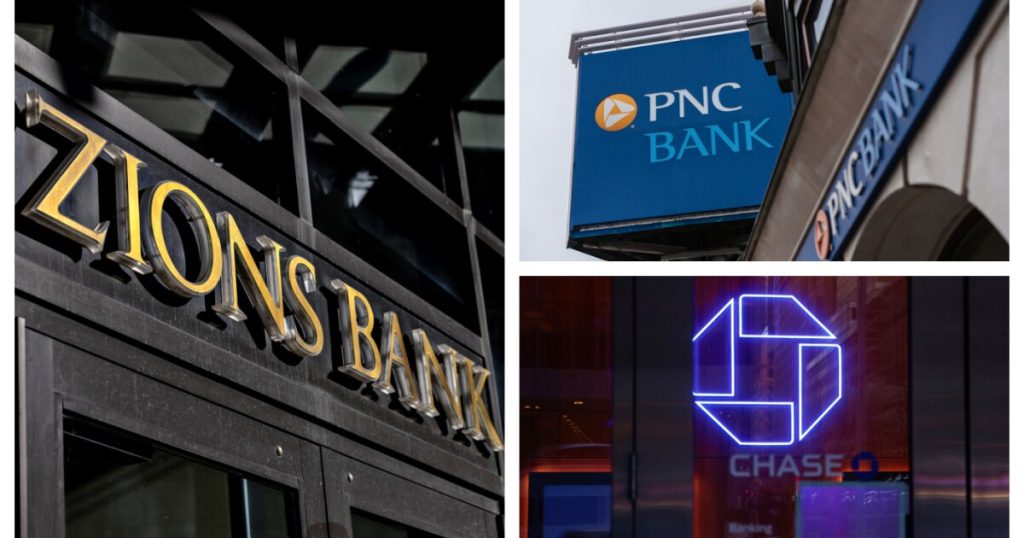Bankers’ opinions about the rapid expansion of the private-credit market are all over the map, as they weigh the opportunities the business provides against the competition it presents and the risks it poses.
Some banking executives are celebrating, others are sounding the alarms, and still more are somewhere in between.
Bank lending to nonbank financial institutions, which includes private-credit funds, has grown to more than $1 trillion — rising at an annualized growth rate of about 19.5% over the past five years — according to a Federal Reserve report from May.
Global banks, and many regional ones, are
But other executives spoke about private credit as a threat, citing potentially grave exposure to poor-quality assets and the threat that the sector poses to traditional banks’ business.
Scott McLean, president and chief operating officer of
He predicted that the private-credit business “absolutely will” explode from an asset quality perspective, leaving borrowers in a difficult position.
“What’s going to happen with private credit is that it’s going to keep growing until something happens [in] the regulatory environment,” McLean said. “Something has to happen. Or it will just blow up like all things that grow really fast and uncontrolled.”
Regulators have
Typically, banks’ secured credit lines are the most senior instruments issued by private-credit lenders, meaning that private-credit lenders must pay off their bank loans before the rest of their debt, like shareholder equity and other liabilities,
Edward Balleisen, a history professor at Duke University, said Tuesday during an event at the Brookings Institution that history suggests “the massive growth of any shadow banking increases the likelihood of a systemic structural crisis that is not going to be stopped by supervision.”
But CEO Jamie Dimon said Tuesday that
“We’re not out here trying to deploy $100 billion,” Dimon said. “But if the business was coming in, and it was a good business where we’re very comfortable, yeah, we’ll deploy more money.”
He added that it’s important to him that
Still, Dimon was skeptical that private credit is the right move for other investors and funds, especially if the economy sees so-called stagflation — when unemployment and inflation both surge.
“Do I think that now is a good time to buy credit if I was a fund manager? No,” Dimon said. “I wouldn’t be buying credit today at these prices and these spreads. … We’re a bank. We still make loans to clients, even when I think spreads are low.”
Ebrahim Poonawala, an analyst at Bank of America Securities, said Wednesday in a research note that the opportunity for banks to take advantage of the private-credit boom represents a “strong value proposition.”
“For as far as we can remember, the U.S. lending backdrop has been fiercely competitive,” he wrote. “We see potential for private credit to coexist with the banks.”
Loans to nonbanks have driven about half of all bank loan growth this year, and they now make up about 10% of all loans in the U.S. banking system, according to a recent analysis by Truist Securities.
Megabanks are better positioned than their smaller competitors to gain from the boom in private credit, Poonawala wrote Wednesday. Fitch Ratings found in a May analysis that just 13 of the biggest banks in the country accounted for nearly 80% of the loan balances to nonbanks.
Last fall, Citigroup announced a five-year, $25 billion partnership with Apollo where it sources deals from existing clients for a finder’s fee, while the investment management firm provides the financing. Vis Raghavan, head of banking and executive vice chair at Citigroup, said at the industry conference Tuesday that the deal was “symbiotic,” adding that private credit has now become “mainstream.”
Meanwhile,
PNC has made plays to keep existing clients’ treasury relationships, even after those companies have moved out of the bank’s credit box. Last year, the bank expanded its partnership with TCW Group through a joint venture.
“I don’t want to do the loans these people are doing. I want the transaction business that comes with the loans. Historically, that’s been a bleed for us … we no longer have that exposure.”
Demchak added that the “ecosystem of private equity” is important to PNC. As private equity firms have increased their ownership of companies, the bank can provide services, like treasury management and securitizations, for those portfolio businesses, he said. Private equity made up around the top three or four clients of PNC’s whole book, according to Demchak.
“That’s a big opportunity — coordinated coverage of our skill sets into private equity,” Demchak said. “Not to provide them cheap capital. That’s the lowest return out of all of this. But rather to be inside of their basic transacting and fee business, which we have a very good product suite for.”
The story is different at Memphis, Tennessee-based First Horizon Corp. CEO Bryan Jordan said his $81 billion-asset bank and the private-credit sector compete more than they partner. Private-credit firms can often offer better terms, duration, price and structure for certain transactions, and they have permeated the real estate lending market “faster than we thought” they would, he said.
“We see evidence of the changing landscape more every quarter than we did in the last, in terms of borrower relationships,” Jordan said. “Is it something that causes us to stay awake at night? No, it’s not at that scale today.”

